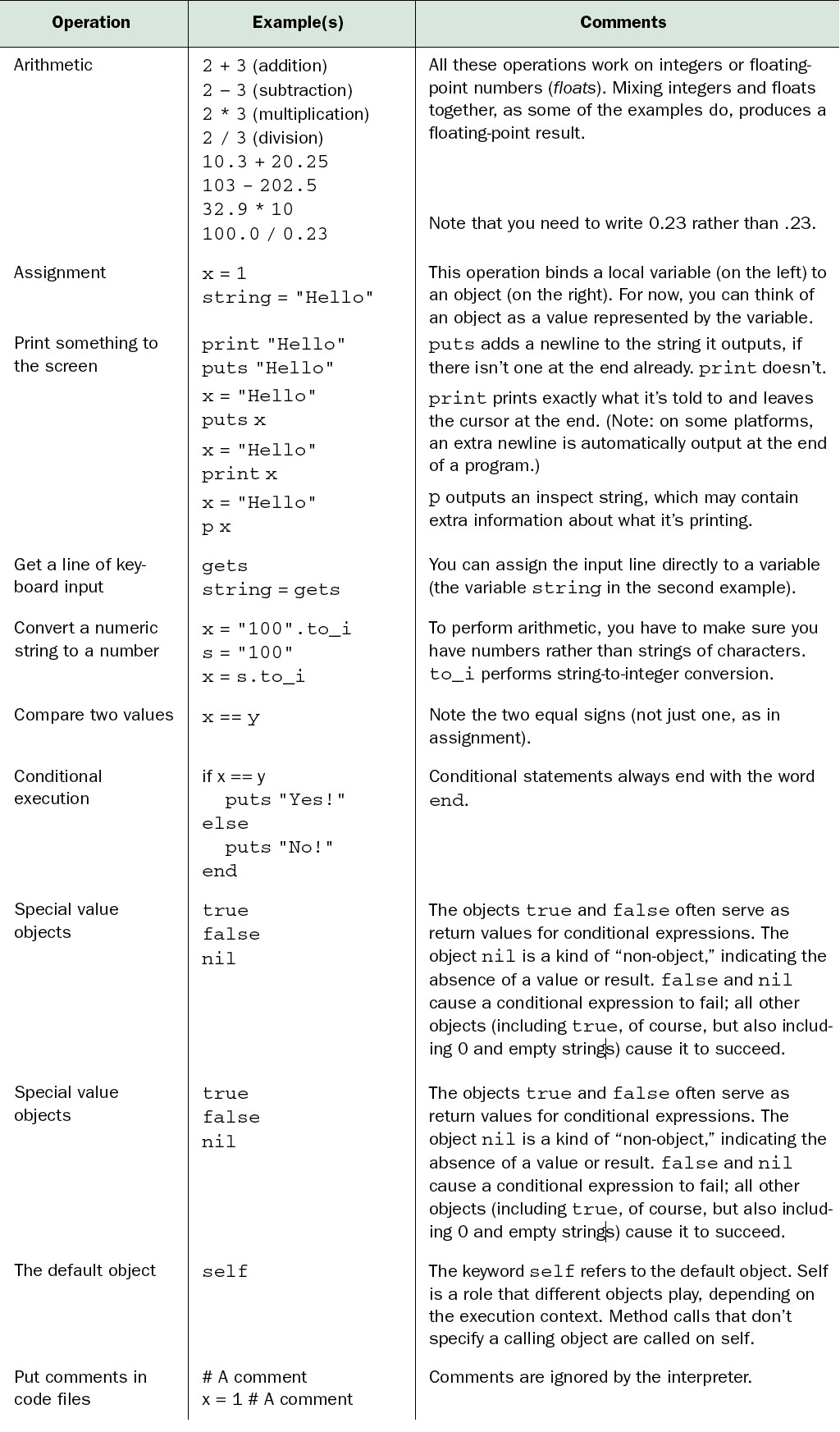Introduction to Ruby for Programmers

This section is intended as a brief, lightweight overview of the Ruby language; following sections will cover all these topics in much more detail. Students are encouraged to ask questions, but instructors are encouraged to answer, "We'll cover that later."
(Originally based upon Ruby Quickstart for Refugees but improved by many.)
Ruby vs. Rails
Ruby is a Language

Rails is a Framework

Rails is written in Ruby
Ruby Philosophy
Q: Did you have a guiding philosophy when designing Ruby?
A: Yes, it's called the "principle of least surprise."
I believe people want to express themselves when they program.
They don't want to fight with the language.
Programming languages must feel natural to programmers.
I tried to make people enjoy programming and concentrate on the fun and creative part of programming when they use Ruby.
- Matz (Yukihiro Matsumoto), Ruby creator
Ruby Philosophy, Applied
- Ruby has a humane interface
- Ruby favors readability and variety over concision and perfection
- sometimes makes code hard to understand (but usually makes it easier)
- contrast to minimal interface
- one (or a few) "right" ways to do things
- Python has a minimal philosophy
Many Rubies
- Ruby 1.0 released in 1996
- Many implementations
- MRI
- REE
- Kiji
- JRuby
- Rubinius
- MagLev
- MacRuby
- IronRuby
Versions common today
- MRI 1.8.7
- MRI 1.9.2
- JRuby
Ruby Language Overview
- Dynamically typed
- Interpreted
- Can be modified at runtime
- Object oriented
- Blocks / lambdas / closures
- Perl-like regular expressions
- Closely tied to shell & OS
IRB: Interactive RuBy
Type irb in the terminal to launch IRB
>> 4
=> 4
>> 4+4
=> 8
Please fire up irb on your computer and try this out!
Everything evaluates to something
>> 2 + 2
=> 4
>> (2+2).zero?
=> false
>> "foo" if false
=> nil
>> puts "foo"
foo
=> nil
Optional semicolons, parens, and return
These are equivalent:
def inc x
x + 1
end
def inc(x)
return x + 1;
end
def inc(x); x + 1; end
Line Break Gotcha
x = 1 + 2
x
x = 1
+ 2
x
Solution: always put operators on top line
x = 1 +
2
x #=> 3
Use parens when you need them
>> "Hello".gsub 'H', 'h'
=> "hello"
>> "Hello".gsub("H", "h").reverse
=> "olleh"
Variables are declared implicitly
first_name = "Santa"
last_name = "Claus"
full_name = first_name + last_name
String interpolation
"boyz #{1 + 1} men"
=> "boyz 2 men"
- Any Ruby code can go inside the braces
- It gets evaluated and stuck inside the string
Built-in Types
- Numbers
- Booleans
- Strings
- Symbols
- Arrays
- Hashes
{:apple => 'red', :banana => 'yellow'}
- Ranges
Functions
def add(a,b)
a + b
end
add(2, 2)
- Note: no 'return' required
Classes and methods
class Calculator
def add(a,b)
a + b
end
end
- a function inside a class is called a method
bang and question methods
- method names can end with
! or ?
-
! means "watch out!"
-
? means "boolean"
equal, double-equal, and threequal
-
x = 1 means "put the value 1 in the variable x"
-
x == 2 means "true if x is 2, otherwise false"
-
x === 3 means the same as == but sometimes more
Ruby syntax cheatsheet

(_The Well-Grounded Rubyist_, p. 5, section 1.1.2)
Ruby identifiers
-
local_variable - start with letter or underscore, contain letters, numbers, underscored
-
@instance_variable - start with @
-
@@class_variable - start with @@
-
$global_variable - start with $
-
Constant - start with uppercase letter
-
method_name? - same as local, but can end with ? or ! or =
- keywords - about 40 reserved words (
def) and weirdos (__FILE__)
- literals -
"hi" for strings, [1,2] for arrays, {:a=>1, :b=2} for hashes
Ruby Naming Conventions
methods and variables are in snake_case
classes and modules are in CamelCase
constants are in ALL_CAPS
Standard is better than better.
-- Anon.
Variable Scopes
var
@var
@@var
$var
VAR
Messages and Methods
- an object is referenced by a variable or a literal
- the dot operator (
.) sends a message to an object
- an object receives a message and invokes a method
- with no dot, the default object (
self) is the receiver
Classes
- A class defines a group of behaviors (methods)
- Every object has a class,
Object if nothing else
load and require
-
load inserts a file's contents into the current file
-
require makes a feature available to the current file
- skips already-loaded files
- omits the trailing
.rb
- can also be used for extensions written in C (
.so, .dll, etc.)
/
#


